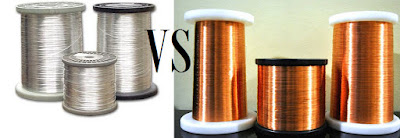In today’s date, copper is widely used as a metal in wide varieties of applications. However, based on the nature of the application for which copper is used, the nature of the metal used will vary. In some cases, bare copper wire can serve the purpose of the application, while in some others it has to be tinned. Asking which one is good will not gives any specific guarantees regarding the performance. There are good bare coppers and bad tinned wires and vice versa. As mentioned, it will largely depend on the purpose of the application, as a whole.
Bare Versus Tinned:
Bare Versus Tinned:
There are several controversies and opinions regarding the nature of the copper wire for different applications. Well, it is true that fresh and new bare wire made of copper can perform excellent, but at the same time, it can even oxidize quickly than the tinned ones. This in turn leads to the degeneration of the electrical performance.
As the metal is thinner, the chances of oxidation are more, and this in turn will create an impact on the application. In such a situation, it is often thought that tinned copper wire is an easy and effective way of keeping the conductor wire from getting oxidized. When copper is oxidized, it turns green, which in turn becomes a semi-conductor. This is definitely bad for good conducting bare copper wire.
There are two ways of preventing the process of oxidation. Something might be put over the metal to prevent air from reaching the surface. After all, air contains moisture, and a slight amount of moisture is enough for oxidation. When there is no air, there is no oxide, and hence no corrosion. Soldering wire can often help in sealing the copper. On the other hand, another way to prevent copper from getting oxidized is putting a layer of tin on the copper. Consequently, even when the insulation is stripped off, air will have a lesser chance to enter and cause the formation of copper oxide.
Problem With Tinned Wire:
However, tin layered copper wire also shows problems in the course of time with the increase in the frequencies of the wire. When the entire conductor is used, the tin layer can protect it. However, as frequencies go high, the amount of conductor used is less. Consequently, the tinned layer becomes prominent and affects the performance of the conductor.
It is important to remember that tin has almost about seven times the resistant capacity of copper. Therefore, if any application at 1MHz or higher should not contain any tinned coating. On the contrary, bare copper wire is ideal for the situation. This implies that video cables, category data cables or digital audio cables should be made of bare copper without any tinned coating on it. This is because they are used for high frequency applications. The tinned copper wires are usually preferable for low frequency applications, and they will tend to last longer.
Hence, understanding the application frequency is crucial in selecting the type of wire.
